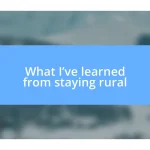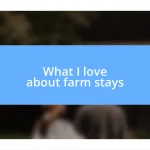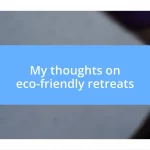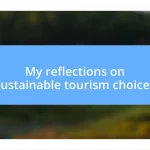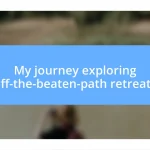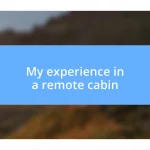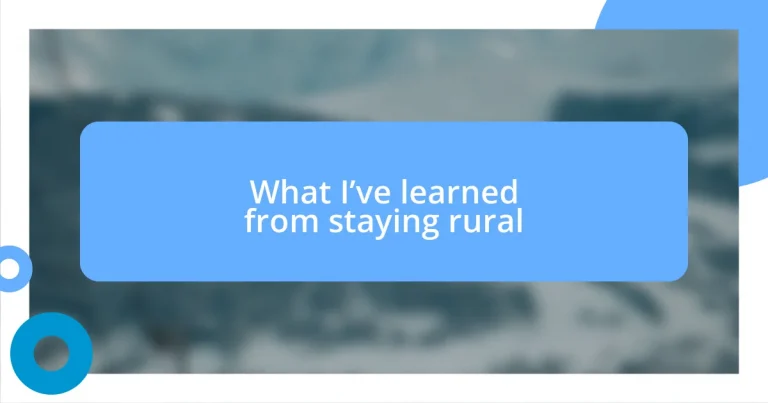Key takeaways:
- Living in a rural area enhances emotional well-being through a strong sense of community, tranquility, and connection to nature.
- Adopting a slower pace allows for mindfulness, authentic relationships, and prioritizing quality leisure time.
- Developing self-sufficiency skills, like gardening and preserving, fosters a deeper connection to the surroundings and promotes personal fulfillment.
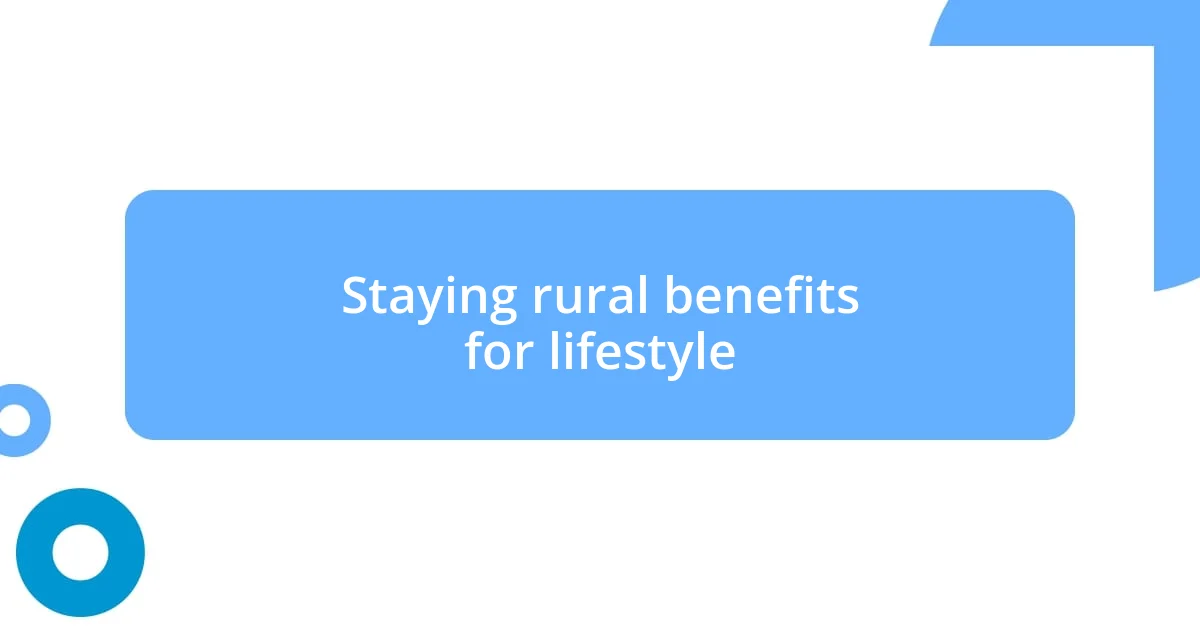
Staying rural benefits for lifestyle
Living in a rural area has undeniably shifted my perspective on what a fulfilling lifestyle looks like. For instance, the slower pace of life allows me time to appreciate the little things, like watching the seasons change in my backyard. Have you ever taken a moment to truly soak in your surroundings? In the quiet of the countryside, I find peace in the sounds of nature – birds chirping, leaves rustling – it’s a gentle reminder to slow down.
One unexpected benefit of staying rural is the strong sense of community that often blossoms in these smaller settings. I remember feeling that warmth when I first moved here; my neighbors brought over homemade pie, eager to welcome me. Isn’t it heartwarming to know that the people around you are genuinely invested in each other’s lives?
Additionally, I’ve noticed that my overall well-being has improved. Without the constant buzz of city life, I’ve been able to reconnect with my passions, like gardening and hiking. Have you ever felt weighed down by the hustle and bustle? Here, I can focus on what truly matters to me, forging a lifestyle that feels not just sustainable, but enriching as well.
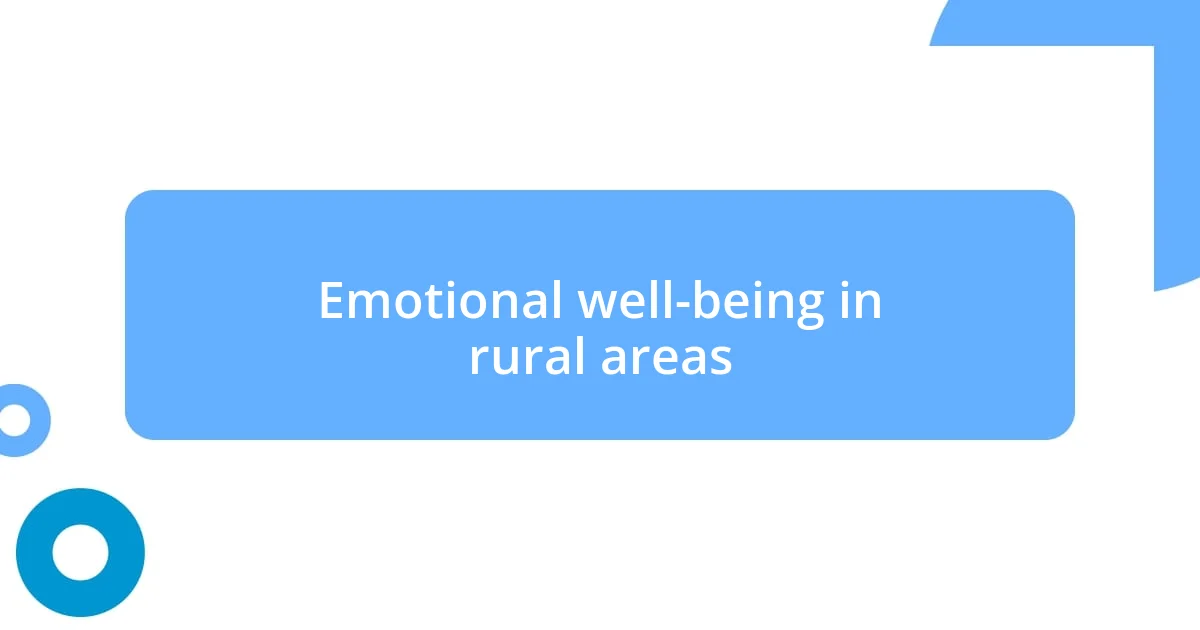
Emotional well-being in rural areas
Emotional well-being thrives in rural areas due to their inherent tranquility and connection to nature. I vividly recall my first sunrise here; the brilliant hues sweeping across the sky blanketed me with a sense of tranquility I rarely found in the city. It dawned on me that every morning could bring such peace, fostering a positive start to each day.
The camaraderie in rural settings can profoundly influence emotional health. I often find myself sharing coffee on my porch with neighbors, discussing our lives, and engaging in heartfelt conversations. These interactions cultivate a sense of belonging that I believe is crucial for mental health.
Moreover, the opportunities for outdoor activities enhance emotional resilience. I often hike the trails surrounding my home, and each trek not only strengthens my physical body but also uplifts my spirit. Has being surrounded by nature ever transformed your mood? For me, those moments in the wild remind me of the simple joys in life, grounding me and reducing stress.
| Factors | Rural Areas |
|---|---|
| Sense of Community | Strong bonds and support networks foster emotional resilience. |
| Connection to Nature | Access to nature promotes calmness and reduces anxiety. |
| Opportunities for Outdoor Activities | Physical engagement boosts mood and enhances well-being. |
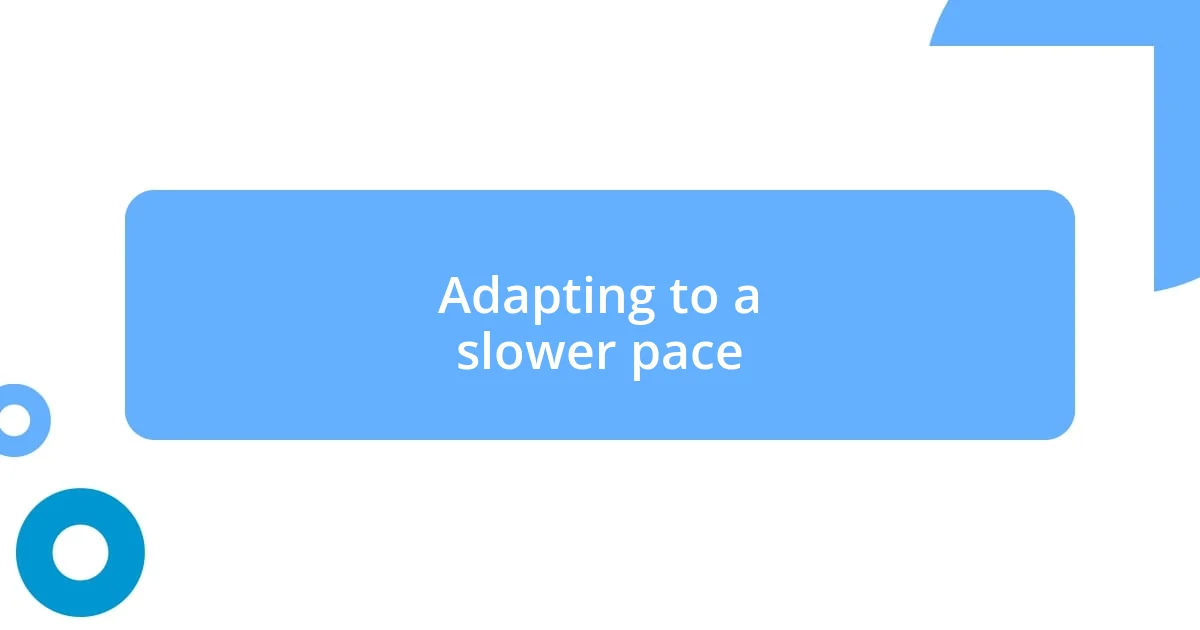
Adapting to a slower pace
Adapting to a slower pace has been a journey of discovery for me. Initially, I found it challenging to let go of my ingrained hustle mentality. One day, while walking through a sunflower field, I experienced a moment of clarity. The vibrant blooms swaying gently in the breeze reminded me that life doesn’t always need to be a sprint. I learned to relish those moments of stillness – to be present and truly absorb the beauty around me. It’s during these simple encounters that I’ve redefined what productivity means.
Here are a few key takeaways from embracing a slower lifestyle:
- Mindfulness: I’ve learned to prioritize being present in the moment, whether I’m sipping tea or gazing at the stars.
- Connection with Nature: Nature has a way of grounding us; the rustle of leaves or a gentle breeze can be a form of meditation.
- Quality Over Quantity: I focus on deepening relationships with fewer people, prioritizing authentic interactions over the superficiality of busy schedules.
- Pacing Activities: I now allow space and time for leisure activities, whether it’s reading a book on the porch or taking longer walks.
Adjusting my pace has opened my eyes, and I feel more in tune with my surroundings and myself. Each day feels rich with potential rather than a checklist waiting to be completed. Being in this slower rhythm has truly changed how I experience life.

Nature’s impact on mental health
Nature plays a significant role in shaping our mental health, often serving as an antidote to stress. I remember a day when I stepped outside to clear my head, only to be enveloped by the sound of birds chirping and leaves rustling. It was in that moment that I realized how profoundly the gentle rhythm of nature can soothe racing thoughts. Have you ever paused to just listen to the world around you? It’s astonishing how those sounds can wash away worries.
Experiencing the seasons has also deepened my emotional connection to the natural world. Last winter, as the first snow fell, I found myself bundled up, marveling at the serene white landscape. That quiet stillness brought me an unexpected joy; it felt like nature was inviting me to slow down and reflect. I believe these moments encourage introspection, allowing for a clearer mind and a more peaceful heart.
Being in nature often prompts me to engage in creative expression. While hiking, I’ve found inspiration in the intricate patterns of leaves and the vibrant colors of wildflowers. Writing down these thoughts and feelings has become a therapeutic practice for me. Have you tried taking your creative pursuits outside? The interplay of nature and creativity sparks something special within, boosting both mood and mental clarity.
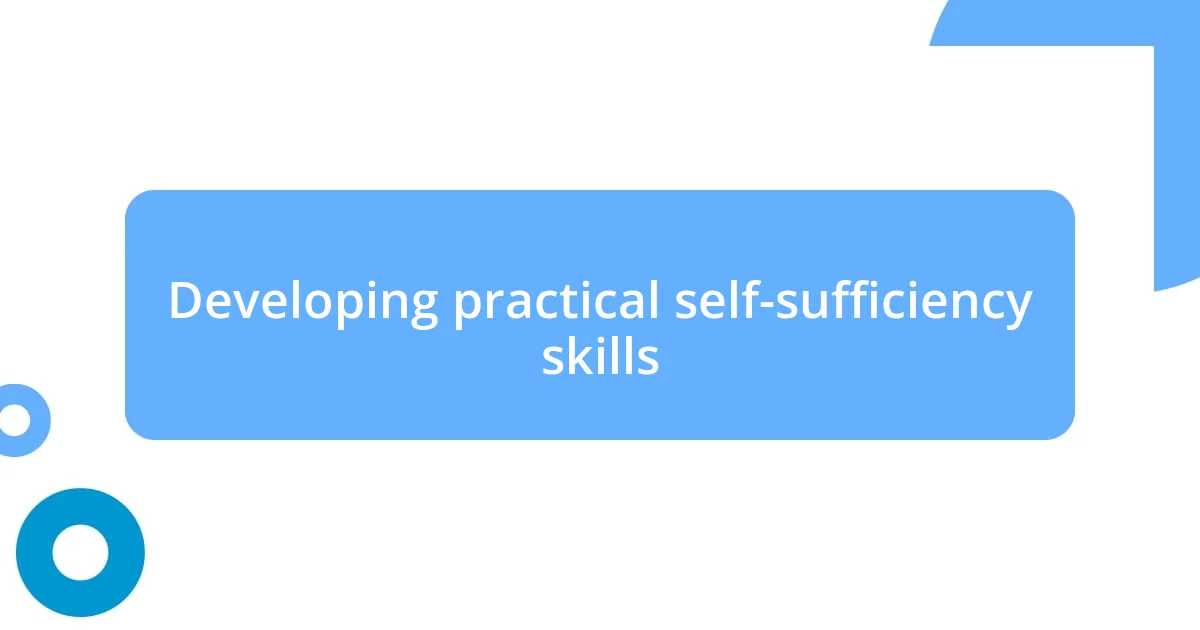
Developing practical self-sufficiency skills
Developing practical self-sufficiency skills in a rural environment has been both rewarding and transformative for me. I remember my first attempt at home gardening; it was a sunny afternoon, and I felt a mix of excitement and nervousness as I sank my hands into the rich, dark soil. Watching those small seeds burst into life taught me not just patience, but the value of nurturing something from the ground up. Have you ever experienced that thrill of pulling fresh produce straight from the earth? It’s a feeling that connects you in a profound way to your surroundings.
As I’ve embraced a self-sufficient lifestyle, I discovered how fulfilling it can be to learn new skills. Just the other weekend, I decided to try my hand at preserving fruits and vegetables. The clinking jars and the sweet, tangy smell of bubbling preserves filled my kitchen, and it felt like rediscovering an old tradition. For me, it’s not just about saving food; it’s about creating something that brings my family together, reminding us of the importance of home-cooked meals. Has there been a moment where you felt proud of what you’ve accomplished with your own hands?
In addition to gardening and preserving, I’ve also dabbled in making my own natural cleaning supplies. This venture started when I learned about the harsh chemicals in many commercial products. I remember the satisfaction of blending simple ingredients like vinegar and essential oils to create a cleaner that not only works wonders but also smells delightful. It became an act of creativity, transforming a routine task into a joyful experience. From my perspective, finding ways to be self-sufficient has not only elevated my everyday life but has imbued each action with purpose. What practical skills could you see improving your own life in similar ways?
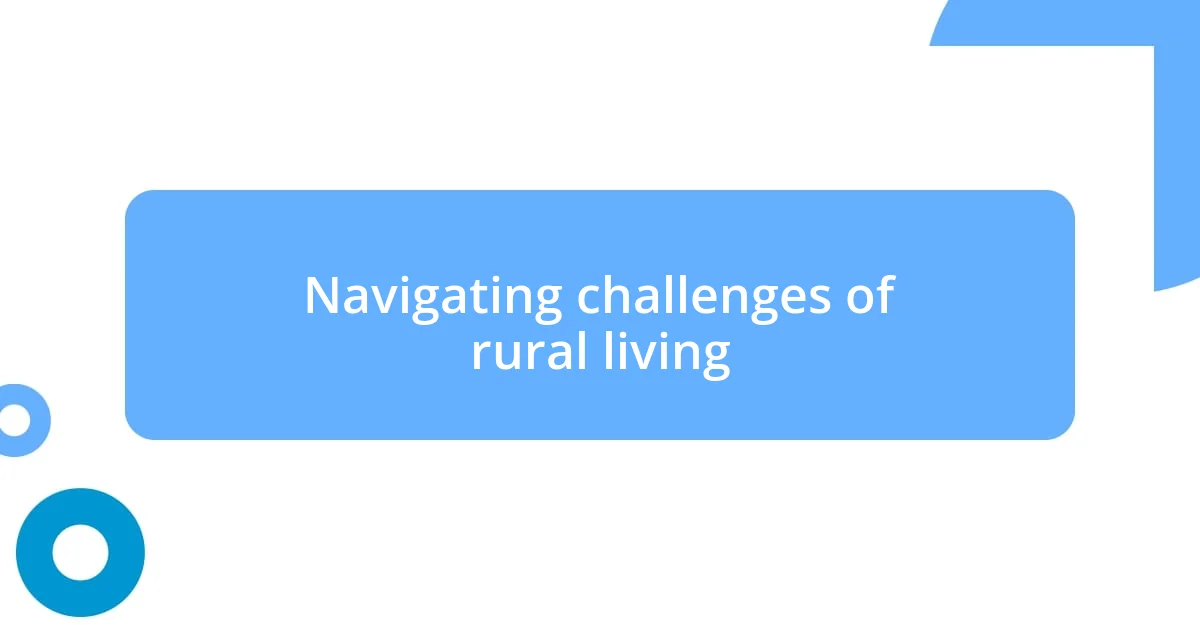
Navigating challenges of rural living
Living in a rural setting presents a unique set of challenges that often require a bit of ingenuity to navigate. One evening, when the power went out during a storm, I found myself rummaging through my drawers, searching for candles and flashlights. That moment reminded me how crucial it is to be prepared for the unexpected. Have you ever had to adapt to sudden changes in your environment? It’s an experience that teaches resilience.
Accessing basic services can sometimes feel like a trek, quite literally. I recall a particularly memorable trip to the nearest grocery store, which was over an hour away, and how it turned into an adventure. The scenic drive through winding country roads was beautiful, but I learned the importance of planning ahead. I’ve started keeping a well-stocked pantry, not just to save on those long trips but also to make cooking creative and enjoyable. How do you handle the challenge of distance in your daily life?
Another hurdle I’ve faced is finding a community that feels like home. I remember my first few months feeling like an outsider, unsure of how to connect with my neighbors. Slowly, by attending local events and volunteering, I forged bonds that turned into meaningful friendships. This experience taught me that while building community can be challenging in a rural area, being open and proactive makes all the difference. What steps have you taken to forge connections in your own surroundings? It’s those relationships that truly enrich our lives and make each challenge more bearable.
